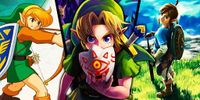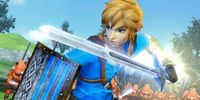With the Nintendo Switch 2 on the horizon, anticipation is building for fresh entries in legendary franchises like The Legend of Zelda and Super Mario. Gamers are eager to see how Nintendo will pivot from the acclaimed Breath of the Wild formula in the next installment of the Zelda series. Speculation suggests that the upcoming console will not only deliver innovative exclusives but also a return of beloved spin-off titles.
Historically, while Super Mario has enjoyed numerous spin-off titles across various genres, the Zelda franchise has remained relatively narrow in comparison. However, as Nintendo prepares for the release of its new console, there's a growing consensus that expanding the Zelda universe through spin-offs could be a fruitful strategy.
Many fans hope to see the franchise explore new gameplay mechanics, much like the successful Hyrule Warriors or rhythmic challenges in Cadence of Hyrule. Such experiments not only diversify the gaming landscape but also give developers the freedom to innovate and explore new narratives and styles without the constraints typical of main titles.
Although spin-offs may never overshadow the legacy of main games like Tears of the Kingdom, which undoubtedly will steer the franchise’s legacy, they present opportunities for creativity. The article highlights how the Nintendo Switch 2's potential technical advancements, particularly the rumored mouse-like functionality of its Joy-Cons, could enable exciting new types of titles. For example, a real-time strategy game using this new feature might allow for unique gameplay experiences in the Zelda universe.
The push for more spin-offs comes as players look back at the acclaimed titles available on the Nintendo Switch. The platform offers an impressive collection of Zelda games, making it easier for newcomers to dive into the series. However, not all entries are equally suited for first-time players.
Among the most recommended titles, The Legend of Zelda: Ocarina of Time, released on November 21, 1998, stands out as a must-play classic, despite its challenging Water Temple. It has aged remarkably well and remains a favorite due to its compelling story and gameplay mechanics. The Definitive Edition on Nintendo 3DS enhances the experience, but the original is available through Nintendo's online services, offering accessibility for new fans eager to explore Hyrule.
On the contrary, Zelda II: The Adventure of Link, launched on December 1, 1988, is widely regarded as the poor entry point due to its stark difficulty and departure from the primary gameplay formula established in its predecessor. It is often described as a brutal challenge for newcomers.
Another duo worth noting includes Oracle of Seasons and Oracle of Ages, both of which were released simultaneously on Game Boy. These titles allow for interconnected gameplay, enriching the experience as players can swap between the two narratives and continue the adventure uniquely.
In discussing the most polarizing entries, The Legend of Zelda: Skyward Sword, released on November 20, 2011, is often criticized for its excessive reliance on motion controls, making it cumbersome for new players, despite having a captivating story.
Conversely, A Link to the Past, which debuted on April 13, 1992, is consistently recommended for its distilled essence of what Zelda games should represent. It offers an expansive world rich with secrets, keeping players engaged for hours.
While many newcomers flock to Breath of the Wild—lauded for its groundbreaking open-world mechanics—there’s a recent addition that promises a more welcoming experience. Released on September 26, 2024, Echoes of Wisdom shifts the protagonist’s focus onto Princess Zelda, offering innovative gameplay that empowers new players through engaging mechanics.
However, not all entries are forgiving; Spirit Tracks, released on December 7, 2009, is notably disparaged for its train traversal mechanics that slow gameplay significantly, moving the action far from traditional adventure expectations.
Ultimately, the future of The Legend of Zelda hinges not only on upcoming mainline titles but also on the potential revival of beloved spin-off genres. This shift could enhance the franchise's depth and accessibility, allowing both veterans and new fans to engage with the universe in novel ways.
Nintendo's approach to the Switch 2 launch could redefine the Zelda games landscape—heralding a new chapter in interactive storytelling and gameplay innovation.





